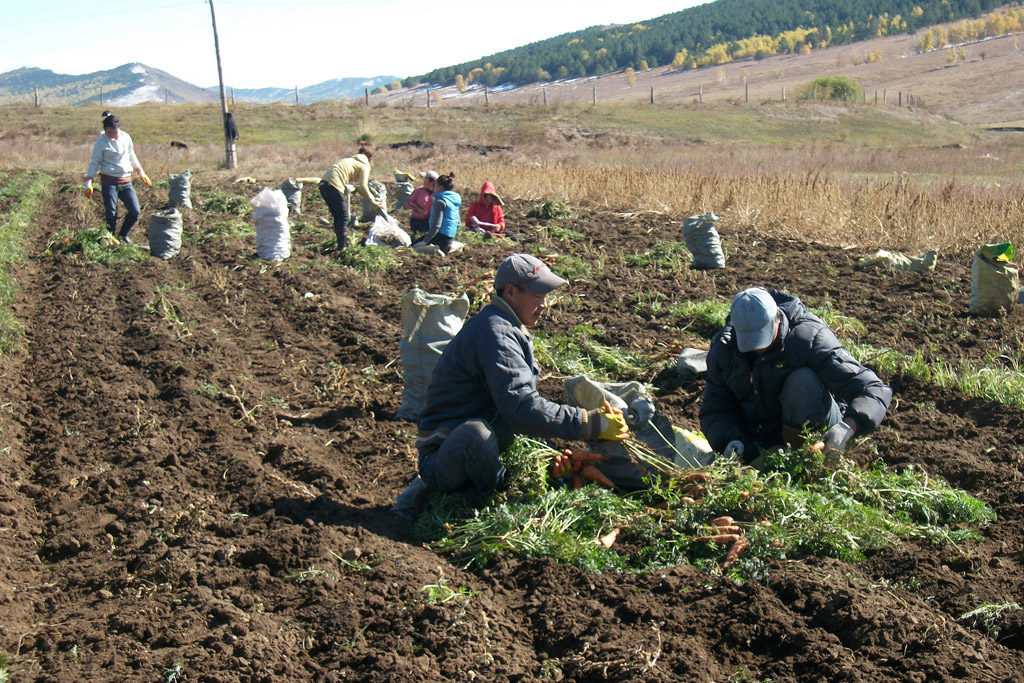South-South Cooperation Key to Overcoming Inequalities, Says UN Deputy Chief
UNITED NATIONS, 18 Sep 2017
UN News Centre – TRANSCEND Media Service

Mongolian farmers harvest carrots as part of an FAO South-South Cooperation Programme between China and Mongolia. Photo: FAO
12 Sep 2017 – Underscoring the importance of South-South cooperation, United Nations Deputy Secretary-General Amina Mohammed today urged sustained commitment to mutually beneficial approaches that will ensure shared prosperity and make sustainable development a reality.
“Solutions and strategies created in the South are delivering lasting results around the world,” she said at an event marking the United Nations Day for South-South Cooperation, held at the UN Headquarters in New York.
“Nearly every country in the global South is engaged in South-South cooperation,” she added, noting China’s Belt and Road Initiative, India’s concessional line of credit to Africa, the Asian Infrastructure Investment Bank, and the Strategic Association Agreement by Mexico and Chile as few examples.
The deputy UN chief, however, also cautioned that progress has been uneven and extreme poverty, deep inequality, unemployment, malnutrition and vulnerability to climate and weather-related shocks persist, and underscored the potential of South-South cooperation to tackle these challenges.
South-South cooperation not a substitute for North-South cooperation
Also in her remarks, the Deputy Secretary-General highlighted that the support of the North is crucial to advance sustainable development.
![]() “South-South cooperation should not be seen as a substitute for North-South cooperation but as complementary, and we invite all countries and organizations to engage in supporting triangular cooperation initiatives,” she said, urging all developed nations to fulfill their Official Development Assistance (ODA) commitments.
“South-South cooperation should not be seen as a substitute for North-South cooperation but as complementary, and we invite all countries and organizations to engage in supporting triangular cooperation initiatives,” she said, urging all developed nations to fulfill their Official Development Assistance (ODA) commitments.
She also urged strengthened collaboration to support the increasing momentum of South-South cooperation as the world implements the 2030 Agenda for Sustainable Development and the Paris Agreement on Climate Change.
Further, noting the importance of the upcoming high-level UN Conference on South-South Cooperation, to be hosted by Argentina on the occasion of the fortieth anniversary of the adoption of the Buenos Aires Plan of Action, she said:
“It will enable us to coordinate our South-South efforts, build bridges, cement partnerships, and establish sustainable strategies for scaling up impact together.”
To mark the importance of South-South cooperation, the UN General Assembly decided to observe this Day on 12 September annually, commemorating the adoption in 1978 of the Buenos Aires Plan of Action for Promoting and Implementing Technical Cooperation among Developing Countries. Ahead of the upcoming UN conference, more than 120 high-level experts from government, academia, civil society, the private sector and multilateral organizations gathered in Buenos Aires recently for a three-day Development Cooperation Symposium, convened by the UN Department of Economic and Social Affairs and the Government of Argentina, to discuss challenges and opportunities for South-South and triangular cooperation for sustainable development.
“There are new challenges to all States: among them, the real threat to multilateralism. South-South and triangular cooperation can contribute to a new multilateralism and drive the revitalization of the global partnership for sustainable development,” Under-Secretary General for Economic and Social Affairs Liu Zhenmin said at the gathering.
DISCLAIMER: The statements, views and opinions expressed in pieces republished here are solely those of the authors and do not necessarily represent those of TMS. In accordance with title 17 U.S.C. section 107, this material is distributed without profit to those who have expressed a prior interest in receiving the included information for research and educational purposes. TMS has no affiliation whatsoever with the originator of this article nor is TMS endorsed or sponsored by the originator. “GO TO ORIGINAL” links are provided as a convenience to our readers and allow for verification of authenticity. However, as originating pages are often updated by their originating host sites, the versions posted may not match the versions our readers view when clicking the “GO TO ORIGINAL” links. This site contains copyrighted material the use of which has not always been specifically authorized by the copyright owner. We are making such material available in our efforts to advance understanding of environmental, political, human rights, economic, democracy, scientific, and social justice issues, etc. We believe this constitutes a ‘fair use’ of any such copyrighted material as provided for in section 107 of the US Copyright Law. In accordance with Title 17 U.S.C. Section 107, the material on this site is distributed without profit to those who have expressed a prior interest in receiving the included information for research and educational purposes. For more information go to: http://www.law.cornell.edu/uscode/17/107.shtml. If you wish to use copyrighted material from this site for purposes of your own that go beyond ‘fair use’, you must obtain permission from the copyright owner.